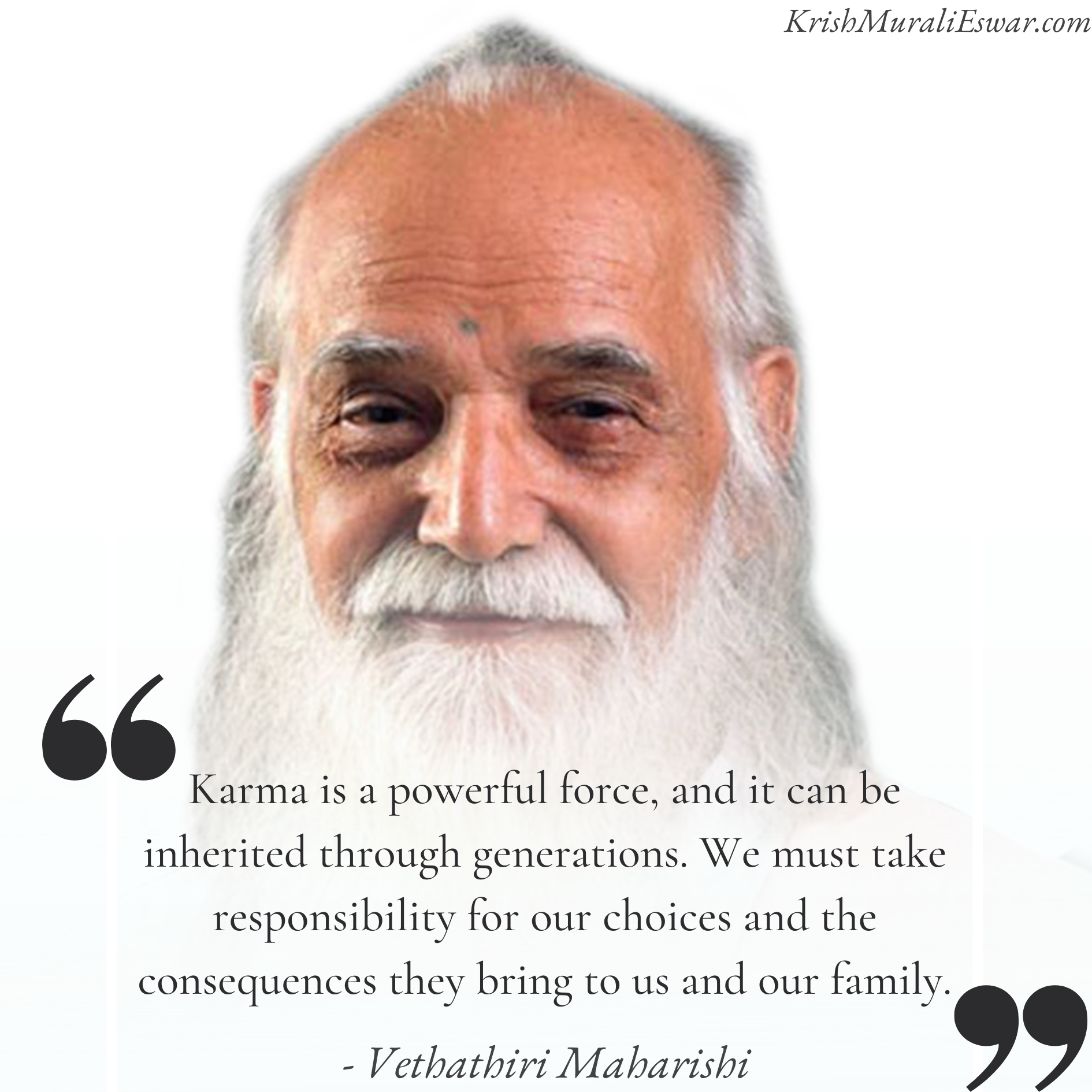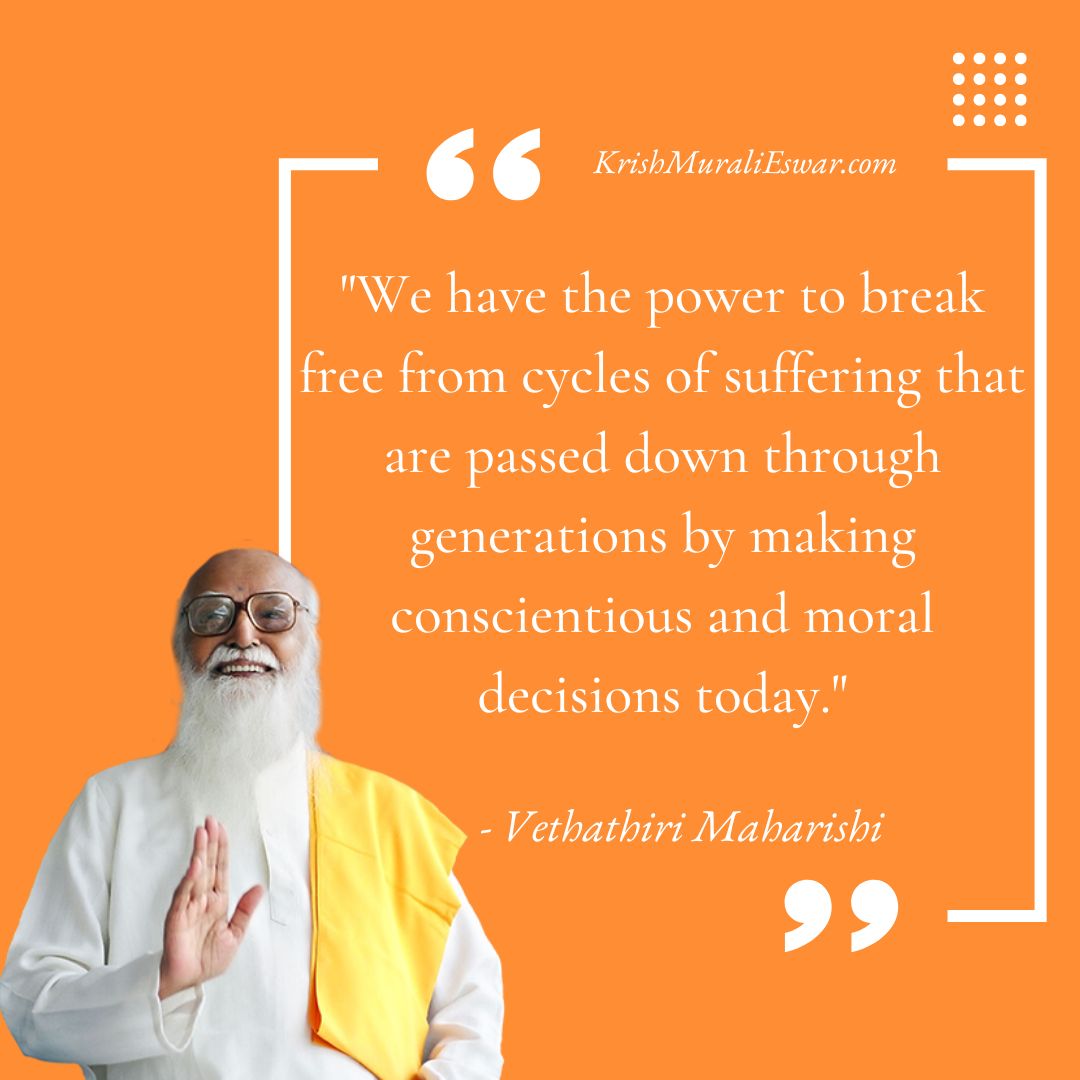
The path of life is full of suffering. We are born into this world and immediately struggle to understand our purpose – why we are here and what we must do. This has been a timeless question asked by philosophers and spiritual masters alike for centuries. Are we truly born to suffer with our Karma?
To answer this profound query, it is essential to travel back in time to the ancient teachings of India. We must look deep within ourselves and contemplate the eternal truth revealed by these wise sages: that we all have a karmic destiny that cannot be avoided or changed. Every action brings us closer to fulfilling this joyous or painful fate.

“He who knows others is wise; he who knows himself is enlightened.”
– Yogiraj Sri Vethathiri Maharishi
To understand the nature of suffering with one’s Karma, we must first gain an understanding of ourselves and our place in this grand universe. In doing so, perhaps we can discover how to transcend the limitations of our karmic destiny while still living a meaningful life.
What Is Karma?
Karma means action.
Karmic Imprint is a memory in the genetic center of the action.
The karmic result is the precise effect of the action.
Every action gives us precise results according to the motive and intensity of the action.
Karma generally refers to the unfailing law of cause and effect in nature.
Karma suggests that our current circumstances are a result of the decisions and actions of our past actions. It also implies that what we do now will have consequences for us in the future. This means that negative behavior can cause suffering for us, while positive behavior can bring about feelings of joy and well-being.
Understanding karma requires contemplation and understanding to comprehend its implications truly. Karma requires sage-like, perspicacious thinking.
It requires us to take responsibility for our choices and accept that the consequences of our actions in our current life may extend far beyond this lifetime. The doctrine of Karma says our children, grandchildren, and future generations will reap the benefits and face the consequences of the accumulation of Karma in our lifetime.
By embracing this idea, we become empowered to create life experiences filled with peace, love, and joy — rather than struggling with suffering caused by negative Karma. As such, we can unlock the potential for true liberation from negative cycles of Karma.
Three types of Karma
The three types of Karma are Sanchita, Prarabdha, and Akamya. These types of Karma define the parameters we live our lives and how our future will unfold.
Sanchita Karma is the accumulated Karma from all previous births that we bring into this life. It’s like a computer program running in the background and determining your destiny based on prior actions. Think of it as a collection of experiences you carry, like mental programming created by past decisions.
Prarabdha Karma is the imprint of this birth’s actions – it’s what sets up your current life situation. This type of Karma is determined by the choices and actions taken in the past and is set in motion once you take birth. Prarabdha Karma can be changed and modified through our current decisions and actions.
Akamya Karma results from our will-based, desire-based futuristic Karma waiting to give us results based on our intent. The choices and decisions create this type of Karma we make now and will determine our future destiny.
What is Bad Karma?
Every action gives us specific results. Wrong actions cause bad results. Our Swamiji offers a simple definition of bad Karma or ‘Sin.’

An action; thought, word, or deed, resulting in pain for self or others, at present or in the future, physically or mentally is a sin. – Yogiraj Sri Vethathiri Maharishi.
What Causes Us To Suffer?
Suffering is a part of life, and we all experience it to some degree. But why do we suffer? Is it because of our own choices or something else? Many believe our suffering is due to our Karma, but this is not necessarily the case.
Karma is often thought of as a cause-and-effect system where our actions result in inevitable consequences. However, Karma isn’t just about our actions – it’s also about how we think and feel. Our thoughts and feelings can create energies within us that manifest as physical reality. So even if we haven’t caused any harm directly, if we feel negative emotions like fear or anger, these energies can lead to situations that bring suffering into our lives.
Therefore, cultivating positive states of mind can help us create more harmony. It’s important to remember that suffering is not inevitable; it is possible to break free from its grip and find peace within ourselves.
What Role Does Karma Play In Suffering?
Karma doctrine says cosmic consciousness is like a mirror, reflecting our past deeds and choices. In it, we can see the suffering that our life has wrought. Suffering is an inevitable part of life; however, Karma can affect how much we suffer. Here are four ways Karma influences suffering:
- Karma brings us what we give out to others: When we give love and kindness to others, it comes back to us tenfold. Similarly, if we act with hatred and contempt towards others, they will return that energy to us.
- Karma shows us our weaknesses: Our weaknesses will be magnified through the karma cycle so that we can identify and address them. Thus, understanding our karmic patterns allows us to take responsibility for self-improvement.
- Karma creates growth opportunities: Suffering can bring about tremendous growth if we learn from it and use it as an opportunity for spiritual transformation. We must use every challenge as an opportunity to become more compassionate and kinder beings.
- Karma teaches us lessons: By looking at our karmic ties, we gain insight into life’s lessons over time. This helps us understand why certain events have happened so that we may break free from old patterns of negative thinking and behavior.
Karma holds valuable insights about the nature of suffering in this world – if only we take the time to look within ourselves for answers instead of blaming external forces for our pain. The key lies in understanding how Karma works so that you may use its power to break free from cycles of suffering and find liberation in all aspects of your life.
Are We Responsible For Our Karma?
The ancient wisdom of the East teaches us that our destiny is essentially within our control – that we are partly responsible for the Karma we create. We live in an entangled universe where our actions carry consequences and shape the future. We can choose to be mindful of our thoughts and actions or succumb to suffering and despair.
Our karmic destiny reflects our free will and choices; like a giant puzzle, it is up to us how we assemble the pieces. We can choose pathways that lead us closer to liberation or ones that cause us to remain stuck in an endless cycle of pain and suffering. Our decisions—even seemingly small ones—have far-reaching effects on ourselves and those around us. By taking responsibility for our Karma and cultivating positive habits, we can transcend mundane existence and experience true freedom.
The key to changing our Karma lies in understanding its fundamental nature: that it is ultimately a product of our choices. With awareness and practice, we can make conscious decisions that bring us closer to enlightenment — findings that have lasting impacts on our lives, both now and in the future. As we journey along this path of self-discovery, may we all find peace amidst the chaos of life’s ever-changing cycles.
Relationship Karma: How Karma is Passed Down In Families?
Is Karma passed down through generations? Since ancient times, this has been a subject of much contemplation and debate. I believe the answer is yes, but we must understand the complexities of Karma and its implications before we can fully appreciate its reach.
Karma is an energy that transcends time and space. It is a law of cause and effect, where each action begets a reaction. When it comes to our families, our ancestors’ actions still impact us today. We have to accept that some of our sufferings may be due to their actions in the past— the debts they incurred may be ours to pay now.

“Karma is a powerful force, and it can be inherited through generations. We must take responsibility for our choices and the consequences they bring to us and our family.” ~ Vethathiri Maharishi
The way out of this cycle is self-awareness and transformation. We must come to terms with our karmic debts to make conscious choices that are not driven by fear or resentment. This realization is essential to create a better future for ourselves and our children. We must learn from the mistakes of those who came before us while at the same time being mindful not to repeat them ourselves. We can only break free from this cycle and find liberation from suffering.
Karma in Relationship: Why do we attract toxic relationships?
I recall a personal experience of a student who wrote to me.
“For years, I found myself drawn to toxic and unhealthy relationships. I wondered why this kept happening, even when I tried to be mindful of the people I chose to be with. But it wasn’t until I looked within that I realized my Karma played a part in my attraction to these relationships.
I began to understand that the karmic ties I had with the people I was drawn to were based on the actions of my past actions and the actions of my ancestors. Through meditation and reflection that you taught me, I could see how past experiences formed my current reality and that I could break free from these patterns.”
By looking at our Karma, we can gain insight into why we attract certain types of relationships in our lives. Through self-reflection and understanding of the karmic ties that bind us, we can make conscious choices in our relationships and break free from the cycle of suffering.
Can We Change Our Karma?
Indeed, we can change our Karma! The Law of Karma is immutable and unchangeable, yet we can create a better destiny for ourselves if we are aware of the law and its effects on our life.
At the same time, it’s important to remember that Karma is a complex interplay between intentional actions and their consequences. We are all responsible for our Karma; no one else can be blamed for our misfortunes or successes. To make fundamental changes in our lives, we must become conscious of the cause and effect of our actions — both good and bad.

No one is a sinner. Past society is to be blamed for errors. ~ Vethathiri Maharishi
If we embrace this truth, we can direct ourselves toward greater wisdom and freedom from suffering. Through practices such as meditation, introspection, self-inquiry, and cultivating human relationships with others, we can gain insight into the workings of Karma and how it affects us. By taking responsibility for our choices — even when they don’t turn out as planned — and making amends when appropriate, we can open up new possibilities for transformation.
Three Methods to Remove Bad Karma
Swamiji recommends three simple ways to remove sin imprints from our genetic center.
- Superimposition
- Expiation
- Neutralization
Superimposition
Superimposing positive thoughts is a powerful way to remove negative karmic thoughts.
By meditating over the Sahasrara chakra, also known as the crown chakra, and going into an alpha mental frequency, we can replace negative thoughts with positive ones. This process helps us create new pathways of thinking that don’t carry any negative energy associated with our old patterns. It’s like rebooting our system and giving ourselves a fresh start.
With this technique, we can learn to be more conscious of our actions and make choices based on what will bring us peace rather than pain. Over time, these new paths of thought will become our default setting—allowing us to make better decisions and create a life that brings us joy.
Expiation Through Atonement
Expiation Through Atonement is restoring balance and harmony to our lives by taking responsibility for evil deeds and making amends. It’s a powerful tool for freeing ourselves from guilt, shame, and regret as we accept our role in the creation of our destiny.

“Man is unique among all living beings on Earth. By the force of habits, ecology and environmental conditions, he is doing sinful deed.” ~ Vethathiri Maharishi
This statement applies perfectly to Karma: we may not realize it until much later in life, but every action we take has a consequence that affects us down the line.
Recognizing this truth allows us to take responsibility for our mistakes and make reparations where needed.
Neutralization Through Kundalini Meditation
By using the powerful technique of Kundalini meditation, we can begin to neutralize our negative Karma and create a brighter future for ourselves.
Kundalini meditation is a practice where a person sits in silence, allowing their body and mind to relax into a meditative state. During this time, they visualize their inner energy or kundalini rising from the base of their spine and enveloping them in its protective light. By focusing on this energy and its positive vibrations, they slowly begin to dissolve all their negative energy — including any past bad karma.
- Ajna meditation neutralizes Akamya karma;
- Sahasrara meditation at Alpha frequency neutralizes Akamya and Prarabdha karma;
- Thuriyatheetha meditation at Theta and Delta frequencies neutralizes Akamya, Prarabdha, and Sanchita Karma.
What Are The Laws Of Karma?
The laws of Karma are like an invisible force, a spiritual law that guides our lives. It’s as if we’re puppets on strings, pulled by the strings of Karma. Everywhere we go, every action we take is guided by this mysterious law.
I liken it to a river. Every move we make sets currents in motion, which ripple outwards, affecting everything in their path. It’s impossible to go against the flow of Karma – it will always guide us toward our destiny. So when we ask ourselves why we suffer sometimes – it’s because of our past choices and how those choices have set us on paths that can lead us to suffer.
#1: The Law of Accumulation
The law of accumulation states that bad Karma accumulates over time. Every adverse action we take has a cumulative effect on our life, creating a pattern of bad luck and misfortune. We can see this in people who make bad decisions consistently—eventually, they find themselves stuck in a rut where nothing seems to go right for them.
On the other hand, good Karma accumulates over time, so when we practice consistent positive behavior and make good choices, it eventually leads to better outcomes.
#2: The Law of Reciprocity
The law of reciprocity states that what goes around comes around. This means that if we do something terrible, it will eventually come back to haunt us. In the same way, if we do something good, we can expect good things to come our way in return.
So it is important to think twice before taking any action—we should always consider how our actions might affect others and the world. If we want positive outcomes in our lives, we need to practice positive behaviors so that our Karma remains balanced.
#3 The Law of Cause and Effect:
Every action results in a reaction and intentional actions will have more significant consequences than unintentional ones.
#4 The Law of Intentionality:
All our thoughts, words, and deeds are imbued with the intention behind them, creating Karma that follows us into our future lives.
#5 The Law of Rebirth:
Our current life is determined by the accumulation of Karma from previous lives; this cycle will continue until we reach enlightenment or liberation from suffering.
Swamiji says that we are the rebirth of our parents. Our children are our rebirths. They inherit our Karma as we inherit from our parents.
#6 The Law of Balance:
Negative Karma can be balanced out by doing good deeds, such as acts of kindness or service to others; this helps to create a more harmonious existence in our current life and the next.
We must look within ourselves for answers and try to understand how our actions have affected us and others around us – this is the only way to unlock the mysteries of Karma and take responsibility for our own lives. By understanding these laws, we can use them to create a more fulfilling life and move closer toward spiritual liberation.
How Do We Attract Positive Karma?
Did you know that according to Vethathiriyam, our Karma can be influenced by our thoughts and actions? This means that we can attract positive Karma into our lives. But how do we do this? As a spiritual master, I will share the keys to attracting positive Karma.
First of all, it’s essential to understand that our actions have an effect on others and ourselves. Every action impacts our Karma, so if we want to attract positive Karma, it’s essential to be conscious of what we do and say every moment. We should strive for conscience in everything we do – from eating, speaking, and working – to ensure that our actions benefit us and those around us.
Secondly, cultivating a positive attitude is essential for attracting positive Karma. Just as you carefully select a dress that best fits your body and expresses your style; similarly, you have to choose the right attitude that best reflects who you are and how you want to be perceived by others.
If you select a dress with bright colors and intricate details, it will attract attention; similarly, a good attitude will draw people toward you. On the other hand, if you opt for dull colors and plain cuts, it may not stand out; likewise, an uninspiring attitude won’t inspire those around you. Therefore, picking an attitude that allows your true self to shine through is essential.
It’s important to be kind to ourselves and others – even in difficult situations – as this will help create harmony in the world. We can also cultivate gratitude for the good things we experience daily and practice forgiveness towards those who have wronged us. These habits will help us develop a more balanced mindset and thus draw more positivity into our lives.
How Can We Protect Ourselves From Negative Karma?
Like a bright sun, our Karma is powerful and can cause us either joy or sorrow. Protecting ourselves from negative Karma and attracting positive Karma is vital to living a life of peace and happiness.
The key to protecting ourselves from negative Karma lies in understanding the power of our intentions. Our thoughts, words, and actions all carry energy that shapes our realities. Symbolically speaking, imagine that each of these three elements is like an arrow fired into the sky: if we shoot arrows of self-destructive intent, then those arrows will come back to us as suffering; conversely, if our intentions are focused on creating a better world for ourselves and others, then those arrows will return to us in the form of positive Karma.

“We have the power to break free from cycles of suffering that are passed down through generations by making conscientious and moral decisions today.” – Vethathiri Maharishi
To protect ourselves from negative Karma:
- We must learn how to recognize and avoid self-destructive patterns of thought and behavior.
- This includes cultivating constant awareness to become more aware of our inner states and how they can affect our outer lives.
- It also involves being conscious about how we respond to situations that arise—for example, choosing not to react with anger or aggression when faced with adversity but responding with compassion and understanding.
- We must also practice making decisions based on what will bring about the most significant benefit for all concerned rather than on selfish desires or impulses.
- This means living with an open heart—being willing to put aside personal ambition to serve others—and having the courage to stand up for what is right, even when it may be challenging or unpopular.
- It also requires developing the wisdom to make wise choices even when faced with difficult circumstances or challenging people.
To achieve lasting freedom from negative Karma, we must commit ourselves fully to this path of self-reflection and transformation while dedicating every moment to service and kindness toward all beings. This is the only way we can truly protect ourselves from suffering caused by negative Karma while simultaneously attracting its opposite: positive karmic energy that brings health, happiness, love, peace, creativity, abundance, success—and ultimately liberation!
Does Karma Have A Purpose?
The age-old question of whether Karma has a purpose continues to perplex us. Like an onion, the layers of this subject unfold each time we look closer. Do past decisions predestine our life, or is it simply a game of chance? I believe Karma has a vital role in our lives, if for no other reason than as a reminder to live with more awareness and intention.
We need to dig a little deeper to get to the bottom of this quandary. We must first understand what Karma is. Karma is simply the law of cause and effect – what you sow, so shall you reap. From this perspective, it’s easy to see how Karma can be used as a personal growth and transformation tool. Through conscious action and mindful thought, we can create positive experiences while avoiding negative ones. When we acknowledge that every action has consequences and make decisions accordingly, we become more conscious creators of our destinies.

No one can take away from you what Providence has allotted for you. ~ Vethathiri Maharishi.
Karma serves as both a blessing and a warning – it allows us to learn from our mistakes while encouraging us to take responsibility for ourselves and our actions. By embracing the concept of Karma, we can understand that there are no accidents or coincidences in life; everything happens for a reason and carries lessons that can help us grow spiritually. As spiritual masters have said for centuries: living with awareness and understanding the power of choice are critical elements to true liberation.
How Can We Avoid Unfavorable Karma Cycles?
The adage rings true regarding Karma: we reap what we sow. But is it possible to avoid the unfavorable cycles of Karma that can leave us helpless and wounded? The answer is a resounding yes! Like a GPS guiding us on our journey, we can use spiritual wisdom as a navigation system to steer clear of negative Karma.
We are all inextricably connected and must take responsibility for our actions. We have the power within us to choose how we respond when life throws curveballs at us; if we make conscious decisions toward greater enlightenment, then this will lead to positive outcomes. This is especially true regarding Karma; if we strive towards higher awareness and act following Dharma (righteous living), this can help prevent unfavorable karmic cycles from forming.

God + Impurities (Sins) = Man; Man – Impurities = God. ~ Vethathiri Maharishi
Our liberation from suffering lies within our hands; cultivating mindfulness and reflective practices allows us to move away from habitual behavior and break free from the chains of Karma. As spiritual masters throughout history have taught us, being mindful of our choices allows us to be accountable for our actions – thus freeing ourselves from any unwanted consequences which may arise.
How Can We Make Amends For Bad Karma?
Many of us have considered the idea that we are all born with a certain amount of Karma. But what happens when our Karma takes a turn for the worse? How can we make amends for evil Karma and restore balance?
The answer lies in understanding how Karma works. Karma is the law of cause and effect; whatever action we take will have an equal, opposite reaction. So if we have done something that has caused negativity, it’s important to take steps to counteract this energy. Here are some ways to do so:
- Acknowledge: Recognize and accept your mistake and express remorse for any harm caused.
- Analyze: Take some time to reflect on why you acted the way you did and identify areas where you could improve.
- Repair: Make an effort to repair any damage caused by your actions, whether by donating or apologizing to someone hurt by your words or deeds.
- Transform: Use this experience to transform yourself by learning from it and making positive changes.

Karma Yoga superimposes good impressions against the impressions of sins.
~ Vethathiri Maharishi
It’s also important to remember that our intentions matter just as much as our actions – if there was no malice behind our mistake, then it may not carry the same negative repercussions as an intentional act of harm. We can use this knowledge to cultivate greater compassion towards ourselves and those around us, understanding that we all make mistakes sometimes, but that doesn’t mean we’re doomed forever! With enough awareness and effort, we can work towards creating a more harmonious life free from suffering.
Karma Yoga: Finding Balance Through Righteous Living
Karma Yoga is an ancient practice dedicated to helping us find balance in our lives through righteous living. It teaches us how to live according to Dharma, the law of righteousness, by cultivating consciousness and developing our sense of morality. By engaging in Karma Yoga, we learn to take responsibility for our actions and cultivate greater empathy for those around us. Most importantly, it helps us break free from the cycle of suffering caused by bad Karma.
At its core, Karma Yoga is about creating a more harmonious life where we are conscious of our choices and strive towards higher awareness.

A proper spiritual approach for changing the behavior of man and establishing World Peace is Karma Yoga. ~ Vethathiri Maharishi.
Two-Fold Moral Culture of Karma Yoga
Swamiji gave us two beautiful rules of Karma Yoga. They are:
- I shall not cause pain to anyone in body or mind.
- I shall strive to remove the pain of others to the extent possible.
These two rules of Karma Yoga are a call to action for every one of us – a reminder that our choices matter and that we can create the life we want through mindful living. By committing to these two laws, we can tap into the transformational power of karma yoga and find balance in our lives.
When we practice ahimsa (non-hurting) and strive to help others remove their pain, we live in harmony with nature and contribute to a more peaceful world. In other words, this is how we can “live a virtuous life” – by using our actions as opportunities for growth and learning.
Practicing Karma Yoga can be the first step towards creating a life free from pain.
What Are The Benefits Of Understanding Karma?
A picture that comes to mind when I think of Karma is a path winding through a forest – it is dark and mysterious, but with each step, we gain understanding. We can’t go back in time and undo the deeds of our past, but we can learn from our experiences and strive to be better people. Understanding Karma brings us one step closer to spiritual enlightenment.

Giving up and giving up whatever is not wanted whether it is men, material, action or enjoyment is the method of purification and enlightenment. ~ Vethathiri Maharishi
Karma is the total of all our good and bad actions. It affects everyone’s life, whether they are aware of it. When we understand how Karma works and take responsibility for our good and bad actions, we start to move toward liberation from this cycle of suffering. By understanding the cause and effect of our actions, we can make more conscious choices about how we want to live our lives.
Karma teaches us that what goes around comes around, so if we do something positive for others or ourselves, those positive energies will eventually return to us too. With this knowledge, we can take greater control over our destiny by making positive choices that align with our highest aspirations and values. And as a result, rather than simply enduring suffering because of past deeds, we can create a brighter future through mindful living under the laws of Karma.
How Can We Help Others With Their Karma?
In the same way that Siddhartha Gautama left his privileged life in search of enlightenment, we must also work to uncover the truth about our Karma.
Firstly, it is vital to recognize the interconnectedness between all beings. We are all part of an intricate web of cause and effect, and our actions have consequences that ripple beyond ourselves. As such, we must extend kindness toward one another and strive to be a positive force in this world.
Secondly, we must listen deeply to other people’s stories and experiences. By actively listening without judgment or expectation, we open up space for understanding and connection – both of which are necessary if someone is going to progress on their spiritual journey.
Finally, meditation is an effective tool for helping others with their Karma. When practiced regularly, it not only helps us cultivate inner peace but also increases our capacity for empathy and compassion toward others. Through meditation, each individual has the potential to become a beacon of light in this world – transforming their suffering into something beautiful.
Karma is an ever-evolving process; we can empower them on their path toward liberation from suffering by being mindful of how our actions affect others. We must remember that even the most minor acts of kindness can make a lasting impact on those around us – allowing us all to feel connected in this great cosmic dance of life.
Blessings are a Powerful Method to Help Yourself and Others
Swamiji has seen that when we focus our energy on sending love, light, and positivity out into the world, it is returned to us in an even greater abundance. Through blessings, we can create a ripple effect of healing energy that touches all those around us – providing relief from pain and suffering.
Blessings allow us to tap into the divine power within us; by connecting with the source of our creativity and potential, we open up pathways to manifesting our deepest desires and aspirations. Blessings also allow us to foster stronger relationships between ourselves and others – creating an atmosphere of mutual understanding and respect.
We must remember that blessings are for the recipient and the giver. By sending positive energy out into the world, we can gain a deeper appreciation of our uniqueness and worth – allowing us to recognize the value in every living being.

Blessings are safe and beneficial always.
Blessings are more powerful and more divine than chanting mantras.
~ Vethathiri Maharishi.
Keep Wishing ‘Be Blessed by the Divine’ or ‘Vazhga Valamudan.’
When we wish someone “Vazhga Valamudan,” we send out a wave of positive energy. This wave carries with it many powerful messages – such as good health, long life, prosperity, peace, and wisdom – that have the power to transform lives. Repeating this phrase can help us reclaim our inner strength and courage when we feel overwhelmed or discouraged.
Each time we share a blessing with someone else, we are helping to create a powerful web of magnetic energy that can help people heal and grow. This energy can spread rapidly and widely, and it can touch even those who may be far away from us.
No matter what challenges life may bring, wishing “Be blessed by the divine” or “Vazhga Valamudan” will always help us stay connected to the source of unconditional love that resides within us all.
What Can We Learn From Our Karma?
We can use our Karma as an opportunity to learn valuable life lessons.
Karma is an influential teacher that can help us gain self-awareness, develop spiritual maturity, and be better people. By understanding our Karma, we can identify patterns of behavior that lead to suffering and take steps to correct them. We can also learn compassion for others by recognizing how our actions have consequences for others. And we can become more mindful in the present moment, so we don’t repeat negative cycles from the past.
Accepting our Karma with grace and humility can open up doors for growth and transformation within ourselves. We will see ourselves more clearly and act with greater wisdom in each moment. In this way, our Karma will no longer be a source of suffering but rather an instrument of liberation and joy.
Conclusion
We are the masters of our destinies, and our Karma determines our future. Our suffering is part of a more profound spiritual journey, and we can use it as an opportunity to grow and learn. It is essential to understand that we can change our Karma for the better with understanding and effort.
We must accept responsibility for ourselves and be mindful of how our actions affect others. By making amends and cultivating good Karma, we create a cycle of positive energy that will benefit us—and those around us—in the long run. We can turn pain into growth, sadness into joy, and darkness into light.
While life may be filled with suffering, we can take comfort in knowing that it doesn’t have to define us. If we look at it through an enlightened lens “with eyes wide open” – as the old saying goes – we can learn valuable lessons from our Karma that will help guide us on the path to peace, love, and happiness.
Please comment and subscribe to my mailing list if you found this article useful. I share spiritual insights and stories of transformation to help you on your journey to becoming the best version of yourself. By subscribing, you can stay connected with me and be the first to know when I post new content!
Be Blessed by the Divine!
Krish Murali Eswar.
Awesome philosophy. Wonderful Presentation. Vazhga Valamudan! Anna!
Vazhga Valamudan. Thank you for your kind words. Be Blessed.